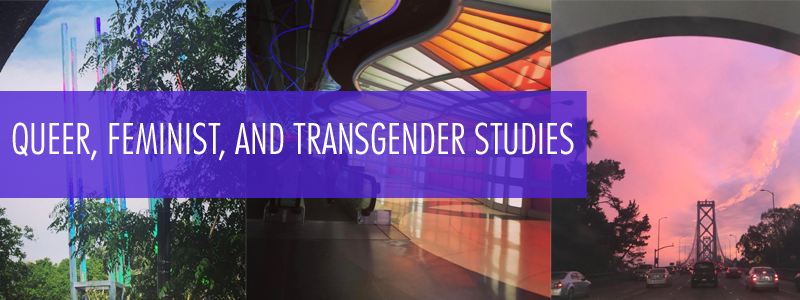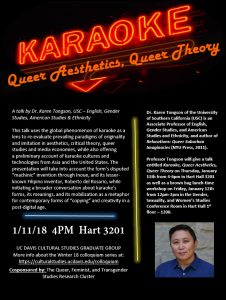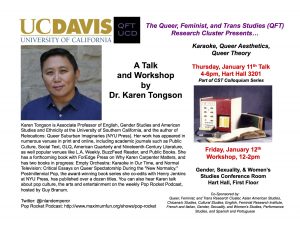QFT 2017-2018 Events
January 11-12th, 2018
A Talk and Workshop by Dr. Karen Tongson (USC)
Dr. Karen Tongson of University of Southern California (USC), is an Associate Professor of English, Gender Studies, and American Studies and Ethnicity, and author of Relocations: Queer Suburban Imaginaries (NYU Press, 2011).
Professor Tongson will give a talk entitled Karaoke, Queer Aesthetics, Queer Theory on Thursday, January 11th from 4-6pm in Hart Hall 3201 as well as a brown bag lunch-time workshop on Friday, January 12th from 12pm-2pm in the Gender, Sexuality, and Women’s Studies Conference Room in Hart Hall.
Talk Title: Karaoke, Queer Aesthetics, Queer Theory
Talk Description:
This talk uses the global phenomenon of karaoke as a lens to re-evaluate prevailing paradigms of originality and imitation in aesthetics, critical theory, queer studies and media economies, while also offering a preliminary account of karaoke cultures and technologies from Asia and the United States. Karaoke is a compound Japanese word: “kara” means “empty,” and “oke” is the contraction of “o-kesutora,” or “orchestra.” Though the conceptual origins of karaoke are largely apocryphal, and have been linked by journalists, enthusiasts and scholars to folk forms of group-singing and sing-along entertainments across a wide historical span from medieval Europe, to Anglo-American vaudeville, to post-World-War-II Japan (from which the name of the activity is derived), the precise origins of the first karaoke machines came to be known in 1996, when a Singaporean television station tracked down its purported inventor, an unassuming Japanese philanthropist and former lounge musician, Daisuke Inoue. The presentation will take into account the form’s disputed “machinic” invention through Inoue, and its lesser-known Filipino inventor, Roberto del Rosario, while initiating a broader conversation about karaoke’s forms, its meanings, and its mobilization as a metaphor for contemporary forms of “copying” and creativity in a post-digital age.
April 12-13th, 2018
A Talk and Workshop by Dr. Kara Thompson (College of William and Mary)
Kara Thompson holds a Ph.D. in English from UC Davis, and is currently an assistant professor of English and American Studies at the College of William and Mary. Kara’s book Blanket is forthcoming (September 2018) from Bloomsbury Press and monograph, Settler Contingencies, Indigenous Futures, is under contract with Duke University Press. Essays have appeared in Tin House, Avidly, The Philosophical Salon, and The Atlantic.
Talk Title: Of Bison and Stone: Wild Contingencies, Queer Reparations
Talk Description:
What would it mean to queer settlement, since settlement is the archetype of heteronormative love: the American romance narrative that prescribes cultivation, reproduction, privacy? A settler’s love of place, of property, is the outcome of a phantasmatic constellation of labor, environment, family, futurity—a royal succession of capital and heteronormativity.
Thompson’s talk, “Of Bison and Stone,” will examine settler structures of feeling, such as entitlement and desire, alongside recent incarnations of the wild and wilding in queer theory. Key questions and provocations include: Does wildness condition dispossession? What would a queer theory of settlement and property entail? Have bison and stone always been a little bit queer?
May 3-4th, 2018
“Queering Care and Cure” Conference, with Keynote Dean Spade
The Queer, Feminist, and Trans Studies Research Cluster (QFT) at the University of California, Davis invites submissions from graduate students and faculty working in the interdisciplinary fields of critical health studies, disability studies, critical science studies, and related fields to the two-day Queering Care and Cure conference. We invite both academic paper submissions for 10-12 minute presentations, as well as other creative formats, which will be displayed in a creative showcase hosted at a gallery in Davis.
This conference centers on queer, feminist, or trans studies perspectives on health, healing, and care practices. Through papers and creative submissions, we plan to interrogate and complicate the ways health, healing, and care practices, discipline and manage bodies by, instead, adopting the lenses of queer, feminist and trans perspectives. Through engaging intersectional analysis attentive to the unequal distribution of care across individual bodies and communities, our conference aims to re-think and re-shape research, theorizing and practices in critical health studies.
Topics include, but are not limited to:
- The medical industrial complex
- The pharmaceutical industry
- Drug use/abuse
- Homelessness/houselessness
- Scientific research on bodies, genders, and sexualities
- Methods of alternative health and healing
- Grassroots and community-based forms of care
- Forms of resistance to medically-codified forms of health and healing
- HIV/AIDS discourse and care past and present
- Disability, chronic illness, and environmental illness
- Mental health or body-mind health
- Immigration, questions of citizenship, borders and borderlands
- Queer of color critique
- Movements for racial and economic justice
- Rights and care for prisoners/incarcerated persons
- Current events and politics invoking discussions of health and care for queer communities
- Radicalizing norms surrounding health and care
Desired Outcomes:
- Intellectual collaboration
- Relationship-building across disciplines and fields
- A re-thinking and re-shaping of critical health studies and related inquiry from feminist, queer, and trans studies perspectives
- Professionalizing and network-building



